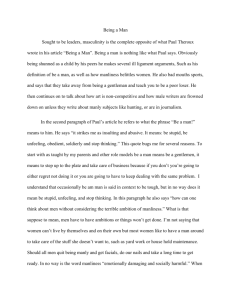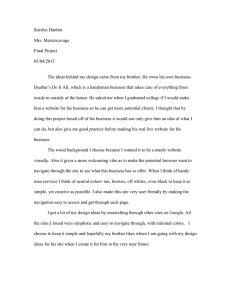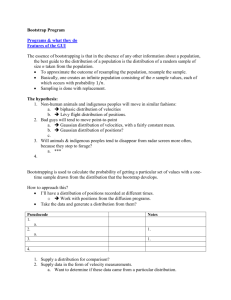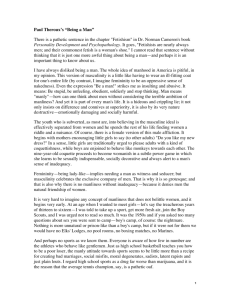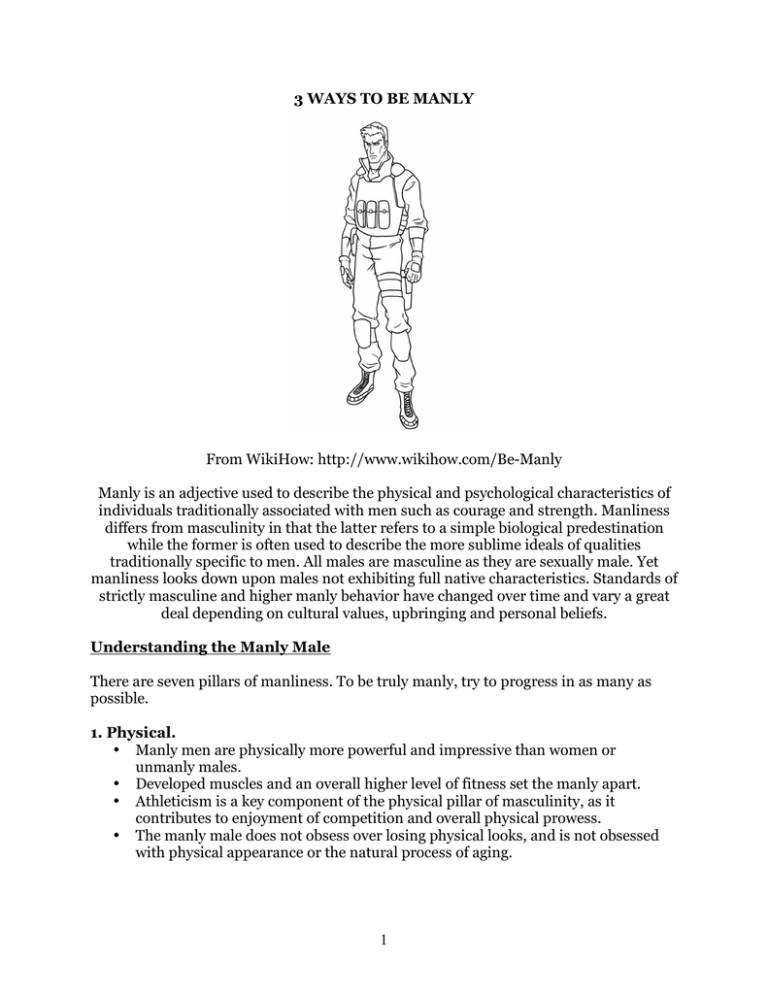
3 WAYS TO BE MANLY
From WikiHow: http://www.wikihow.com/Be-Manly
Manly is an adjective used to describe the physical and psychological characteristics of
individuals traditionally associated with men such as courage and strength. Manliness
differs from masculinity in that the latter refers to a simple biological predestination
while the former is often used to describe the more sublime ideals of qualities
traditionally specific to men. All males are masculine as they are sexually male. Yet
manliness looks down upon males not exhibiting full native characteristics. Standards of
strictly masculine and higher manly behavior have changed over time and vary a great
deal depending on cultural values, upbringing and personal beliefs.
Understanding the Manly Male
There are seven pillars of manliness. To be truly manly, try to progress in as many as
possible.
1. Physical.
• Manly men are physically more powerful and impressive than women or
unmanly males.
• Developed muscles and an overall higher level of fitness set the manly apart.
• Athleticism is a key component of the physical pillar of masculinity, as it
contributes to enjoyment of competition and overall physical prowess.
• The manly male does not obsess over losing physical looks, and is not obsessed
with physical appearance or the natural process of aging.
1
2. Functional.
• Manly men are physically more powerful and impressive than women or
unmanly males.
• Developed muscles and an overall higher level of fitness set the manly apart.
• Athleticism is a key component of the physical pillar of masculinity, as it
contributes to enjoyment of competition and overall physical prowess.
• The manly male does not obsess over losing physical looks, and is not obsessed
with physical appearance or the natural process of aging.
3. Sexual.
• The male typically seen as manly if he is sexually assertive, bold, and experienced.
• Married or single
4. Emotional.
• Tolerant and in control are characteristics of the manly man.
• To be overly emotional is to lack control of one’s self and environment.
• An assured leader that others look up to and in control of his emotions.
• It is manly to be calm, provide emotional support for those in need, and not be
weepy. Knowing when to empathize shows a true man.
5. Intellectual.
• Manliness is logical, intellectual, rational, objective and practical, not overtly
emotional.
6. Interpersonal.
• A man seeks leadership roles such as guiding, disciplinarian, independent, free,
individualistic, demanding.
• Manliness is self-satisfied in that it does not seek nor need the approval of others.
• The manly need respect as the womanly need love.
7. Distinctive.
• Setting manliness apart from the feminine or unmanly males proves that person's
insecurity.
• Manliness is wild and seeks the wild.
• The manly consider risking loss to stand for important beliefs or principles.
• As a mother’s touch is civilizing, a manly instinct is rough and indelicate.
Become the Manly Male
1. Physical.
• Lift weights, play sports, get coaching and lessons.
• Stand up straight with a poised, erect stature.
• Get a personal trainer.
• Look to Paul Bunyan, John Wayne, or Men’s Journal for appropriate dress, then
stop caring what people think of your looks.
• Watch boxers or MMA fighters for inspiration.
2. Functional.
2
•
•
•
•
If a husband or father, develop and exhibit your leadership qualities.
If a boyfriend, develop your masculine maturity and find appropriate
opportunities to learn to be a manly gentleman in that role.
Find a mentor from whom you can learn.
Emulate manly role models, familiar friends or famous heroes.
3. Sexual.
• If single, work to become sexually confident and dominant.
• Get a dating-help program or ask that “player” buddy who has all the luck with to
help you out
• Get out and meet more dates. Don’t be shy and pathetic and only hang out with
friends.
• If married, please your partner.
4. Emotional
• Honestly critique your emotional state and tackle your weaknesses in every
situation in which you fall short.
5. Intellectual.
• Develop your logical skills.
• Join a debate team.
• Take math classes.
• Approach decisions and problems objectively.
6. Interpersonal.
• Seek leadership roles in organizations.
• Join sports teams.
• Project confidence and do not seek the approval of others.
• Save your tenderness for your relationships with women, but be a Rock of
Gibraltar on whom the more emotional can lean on when necessary.
7. Distinctive.
• Buy a gun.
• Go hunting.
• Be assertive in meetings at work.
• Seek competition and revel in your new-found competitiveness.
Live Manliness
1. Physical.
• Enjoy your new strength and athleticism.
• Enjoy your athleticism, but do not put it on display.
• Take good care of your body—diet and exercise.
2. Functional.
• Be a leader in the family and outside.
• Assume authority and seek responsibility to lead others.
3
3. Sexual.
• Pursue partners, don’t just timidly express interest or desire abashedly from the
shadows.
• Do not be afraid to explore all aspects of your sexuality.
4. Emotional.
• Feel the strength that comes from others who look up to you.
• Be there for those who need emotional succor or for males needing a role model.
5. Intellectual.
• Tackle problems with dispassionate ease as you think in a manly way.
6. Interpersonal.
• Be self-possessed and assured in your interpersonal relationships, now
invigorated by manliness.
7. Distinctive.
• Enjoy uninhibited competition.
• Roam the wild, and save an entire eco-system from destruction.
• Stand for your dearest-held beliefs.
• In short, make civilization better.
Tips
•
•
•
•
•
Be moral, loyal, honest, humble, charitable, strong, supportive, helpful, and
caring.
Don't let anyone walk over you; read "The Manipulated Man" and "The Myth of
Man Power".
Speak up for yourself and your fellow men.
Emulate manly role models and heroes, famous or familiar friends.
Stand up for Women and children and all beings weaker than you!
4
from wikipedia.org:
!Junot Díaz (born December 31, 1968) is a Dominican American writer, creative writing professor at
Massachusetts Institute of Technology (MIT), and fiction editor at Boston Review. He also serves on
the board of advisers for Freedom University, a volunteer organization in Georgia that provides
post-secondary instruction to undocumented immigrants. Central to Díaz's work is the immigrant
experience.He received the Pulitzer Prize for Fiction for his novel The Brief Wondrous Life of Oscar
Wao, in 2008. He is a 2012 MacArthur Fellow.
!from https://www.macfound.org/fellows/864/#sthash.HFb5kiRw.dpuf:
!Junot Díaz is a writer whose finely crafted works of fiction offer powerful insight into the realities of
the Caribbean diaspora, American assimilation, and lives lived between cultures. Born in the
Dominican Republic and living in the United States since adolescence, Díaz writes from the vantage
point of his own experience, eloquently unmasking the many challenges of the immigrant’s life.
With skillful use of raw, vernacular dialogue and spare, unsentimental prose, he creates nuanced
and engaging characters struggling to succeed and often invisible in plain sight to the American
mainstream. In Drown (1996), an anthology of interrelated short stories, Díaz describes his
narrator’s coming-of-age in New Jersey and the Dominican Republic, deftly interweaving complex
chronologies, particulars of place, and shifting narrative perspectives. The Brief Wondrous Life of
Oscar Wao (2007), Diaz’s first novel, follows three generations of a family living in both the
Dominican Republic and the United States. Through the striking voice of the narrator—a mix of
Spanish, English, and street slang with myriad literary and popular culture references—Díaz
approaches the complicated and troubled history of the Dominican Republic with humor and irony
while also tracing the legacy of the violent Trujillo regime, both for those who lived through it and
those who left. In these book-length works and numerous other short stories and essays, Díaz
composes vivid narratives that capture the texture of day-to-day survival and draw readers into the
various and distinct worlds that immigrants must straddle.
!Junot Díaz received a B.A. (1992) from Rutgers University and an M.F.A. (1995) from Cornell
University. He was affiliated with Syracuse University (1997–2002) prior to joining the School of
Humanities, Arts, and Social Sciences at the Massachusetts Institute of Technology, where he is
currently the Rudge and Nancy Allen Professor of Writing. His additional publications include the
story collection This Is How You Lose Her (2012) and short stories in The New Yorker, the Paris
Review, and Callaloo, among others.
!!
!!
!
!!
!!
!!
!!
!Jamaica Kincaid
Caribbean American author
!Jamaica Kincaid, original name Elaine Potter Richardson (born May 25, 1949, St. John’s,
Antigua), Caribbean American writer whose essays, stories, and novels are evocative portrayals
of family relationships and her native Antigua.
!Kincaid settled in New York City when she left Antigua at age 16. She first worked as an au pair
in Manhattan. She later won a photography scholarship in New Hampshire but returned to New
York within two years. In 1973 she took the name Jamaica Kincaid (partly because she wished
the anonymity for her writing), and the following year she began regularly submitting articles to
The New Yorker magazine, where she became a staff writer in 1976. Kincaid’s writings for the
magazine often chronicled Caribbean culture. Her essays and stories were subsequently
published in other magazines as well.
!In 1983 Kincaid’s first book, At the Bottom of the River, a collection of short stories and
reflections, was published. Setting a pattern for her later work, it mixed lyricism and anger.
Annie John (1984) and Lucy (1990) were novels but were autobiographical in nature, as were
most of Kincaid’s subsequent works, with an emphasis on mother-daughter relationships. A
Small Place (1988), a three-part essay, continued her depiction of Antigua and her rage at its
despoliation. Kincaid’s treatment of the themes of family relationships, personhood, and the
taint of colonialism reached a fierce pitch in The Autobiography of My Mother (1996) and My
Brother (1997), an account of the death from AIDS of Kincaid’s younger brother Devon Drew.
Her “Talk of the Town” columns for The New Yorker were collected in Talk Stories (2001), and
in 2005 she published Among Flowers: A Walk in the Himalaya, an account of a plantcollecting trip she took in the foothills of the Himalayas. The novel See Now Then (2013)
chronicles the late-life dissolution of a marriage by way of the jilted wife’s acerbic ruminations.
!from britannica.com
!!
!
!!
!!
!!
!!

